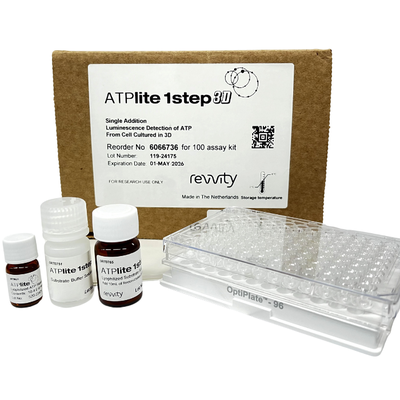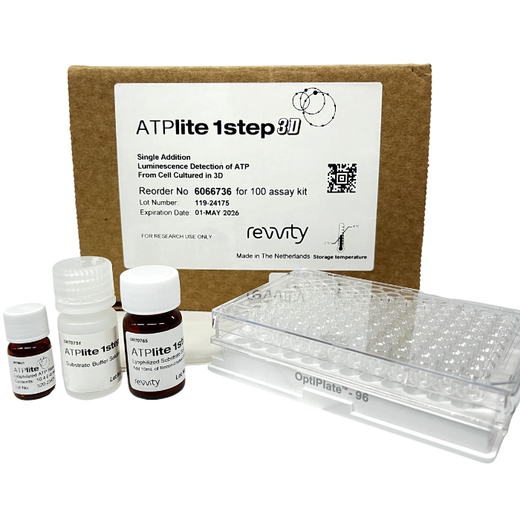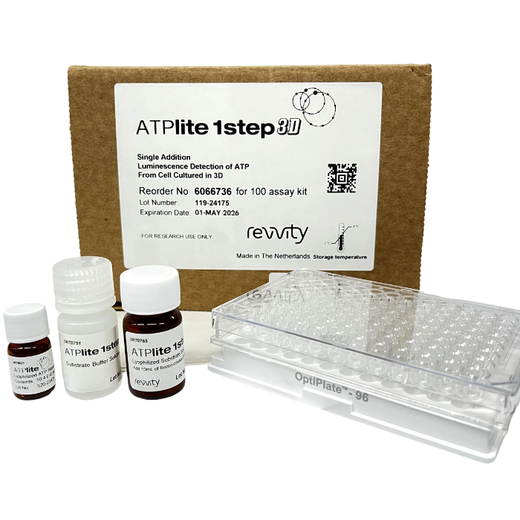
ATPlite 1step 3D, 10 mL kit

ATPlite 1step 3D, 10 mL kit




ATPlite 1step 3D assay for quantitative evaluation of proliferation and cytotoxicity of mammalian cells cultured in 3D spheroids. The 1-step format only requires one addition step, and can be used for continuous processing.
| Feature | Specification |
|---|---|
| Application | Cell Viability |
| Assay Points | 100 |
ATPlite 1step 3D assay for quantitative evaluation of proliferation and cytotoxicity of mammalian cells cultured in 3D spheroids. The 1-step format only requires one addition step, and can be used for continuous processing.


ATPlite 1step 3D, 10 mL kit


ATPlite 1step 3D, 10 mL kit


Product information
Overview
ATP is a marker for cell viability because it is present in all metabolically active cells. Because ATP concentration declines rapidly when cells undergo necrosis or apoptosis, monitoring ATP is a good indicator of cytocidal, cytostatic and proliferation effects. Our ATPlite 3D and ATPlite 1step 3D luminescence assay systems use patented innovative technologies that measure cell proliferation and cytotoxicity in 3D cultured mammalian cells based on the production of light caused by the reaction of ATP with added luciferase and D-luciferin.
Our Luminescence ATP 1step 3D Assays are an Adenosine TriPhosphate (ATP) monitoring system based on firefly (Photinus pyralis) luciferase. This atp luminescence 1step 3D assay kit is the alternative to colorimetric, fluorometric, High content microscopic analysis and radioisotopic assays for the quantitative evaluation of proliferation and cytotoxicity of mammalian cells cultured cultured in 3D spheroids. ATP monitoring can be used to assess the cytocidal, cytostatic and proliferative effects of a wide range of drugs, biological response modifiers and biological compounds.
Kit Components
- 1 vial of Lyophilized Substrate Solution
- 1 x 10 mL of Substrate Buffer Solution
- 1 vial of Lyophilized ATP Standard Solution
- 1 x CellCarrier Spheroid ULA 96-well microplate (product # 6055330; 10 plates, 6055334; 40 plates)
- 1 x OptiPlate-96 (product# 60052900 for 50 plates; 6005299 for 200 plates)
- 4 x TopSeal-A (product # 6050185; 100 seals)
- 1 x Quick Start Guide
Storage: Buffer and vials should be stored at 4°C. Microplates and TopSeal-A can be stored at Room Temperature.
Features and benefits:
- Designed for continuous process systems: luminescence should be measured between 0 and 30 minutes after the last pipetting step
- Rapid: results generated in 25 - 30 minutes
- Simple and reproducible: only one reagent addition step, no separation steps. A final transfer step may be necessary, depending on the type of plate used for Spheroid growth.
- Homogeneous assay: no cell harvesting or centrifugation required
- Wide linear dynamic range: detect ATP from spheroids made by seeding as few as 200 cells, and up to 5000 cells
- Convenient storage conditions (2 - 8 °C)
- No DTT: Unlike most luciferase detection reagents, lites products do not contain DTT, eliminating toxic hazards, unpleasant odors and the need for hood work
- Excellent Z' Values: All lites products offer robust, sensitive performance, with high signal-to-background ratios and excellent Z'values
Specifications
| Application |
Cell Viability
|
|---|---|
| Assay Points |
100
|
| Automation Compatible |
Yes
|
| Brand |
ATPlite 3D
|
| Detection Modality |
Luminescence
|
| Format |
Microplates
|
| Protocol |
1-step
|
| Signal Halflife |
0.5 hour
|
| Shipping Conditions |
Shipped Ambient
|
| Unit Size |
10 mL
|
Resources
Are you looking for resources, click on the resource type to explore further.
Discover the cutting-edge of luminescence assay technology, offering unparalleled sensitivity and dynamic range for applications...
3D cell cultures offer a more physiologically relevant option, but there are currently only a few high throughput screening (HTS)...
In the process of developing new therapeutic molecules, toxicity – whether it is to be avoided or whether it is desired – is an...
Luciferase assays are essential for examining transcriptional gene expression, virus life cycles, and cell viability. These assays...
Loading...


How can we help you?
We are here to answer your questions.






























